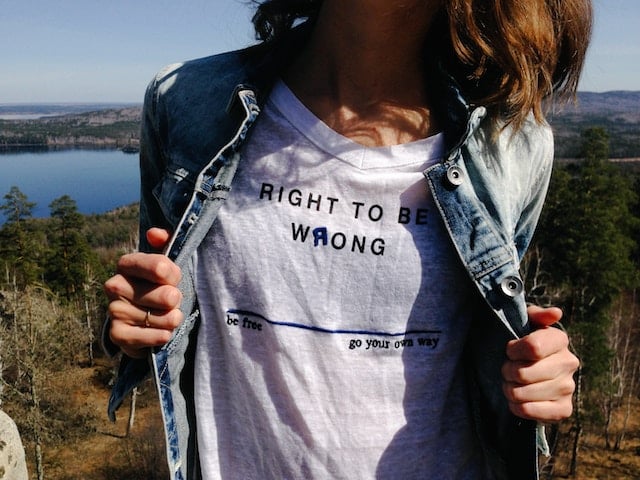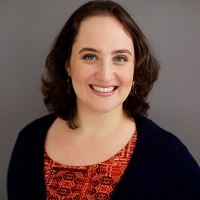
After five years of graduate school, my husband is becoming ordained as a rabbi this spring.
While I have all kinds of feelings about what it means to be a rabbi’s wife, I’m super excited that his hard work and dedication has paid off and that soon he will be working in some synagogue somewhere, helping people in a community connect to one another and make the world a better place.
And I will be with him at some synagogue somewhere. That’s right—in just a few months I will be relocating my entire life to some unknown place. It’s an exciting time, but the uncertainty is not my cup of tea.
Is it anyone’s?
My immediate response to the uncertainty was to figure out how I could be in control of this situation.
I did my research. I made spreadsheets of the costs of living in all of our potential new locations. I formatted his resume and edited his sample sermon. I made pro and con lists of all the job openings. I did all this to make myself feel like I could control the outcome of this process.
And even though those things did satisfy some urge of mine to feel ownership of a job search that will impact my life, it didn’t actually make me feel in control.
Because we are never fully in control of what happens.
Whether it’s a spouse’s job search, the newest political upset, or the well-being of our own bodies, we just don’t have the ability to determine what happens. And even though that’s scary, it is the reality of our everyday lives.
So let’s stop trying to respond to overwhelm and uncertainty with an urge for control. Instead, let’s focus on choice, because there’s a huge difference between being in control and being in choice.
Being in control means knowing what you want, making it happen, and getting the desired outcome. In other words, a human impossibility.
Being in choice means knowing what you want, trying to make it happen, and choosing how to respond to whatever the outcome is.
This difference is vital to coming back from the edge of uncertainty and overwhelm. Because we are never truly in control, but we always get to choose how we respond.
It’s important to say that being in choice isn’t about tricking ourselves into positive thinking. It’s a much more nuanced process than that.
Here’s how I practice being in choice:
Intention
Intention anchors us to what we desire. We desire a few minutes to ourselves at the end of the day. We desire higher energy and better sleep. We desire relationships that are nourishing instead of draining.
In my case, my intentions are to make a home for myself and my family that allows us to be fully ourselves, to invite in new experiences, and to acknowledge the things I am afraid of.
Intention has to be the starting point, otherwise, any actions we take will not be rooted in what we really need, but will just be a knee-jerk reaction to the out-of-control-ness we are trying to get away from.
I can use my intentions of being myself, inviting in new experiences, and acknowledging my fear to help me make choices as the puzzle pieces of my life start to come together.
Curiosity
Curiosity is a beautiful tool that helps us navigate the experiment that is life. It is the emotional opposite of judgment and protects us from our overactive imaginations. When we try to make something happen in our lives and it doesn’t work out, curiosity is there to let us reflect on what went wrong without giving up.
I started a list of all of the questions I am curious about.
Who will I meet in this new place?
What will our neighborhood be like?
How will our finances change?
How will it all feel?
I don’t have any of the answers—and that isn’t easy. But reminding myself to be curious as the answers come into view helps me to be in choice as we move forward.
Action
Action is the final key. Together with intention and curiosity, taking action toward what we want is the epitome of being in choice.
And the difference between action while being in choice and action while being in control is that when we’re in choice, it doesn’t have to work. Our actions don’t have to be “successful.” They are, in themselves, an embodiment of our desire and will—and that’s enough.
I am still making pro and con lists. I will be visiting communities with my husband to see which ones will be the best fit. I will be advocating for what I believe will be best for our family and doing what I can to make that happen.
Not because I have control over exactly what happens, but because I get to act based on what I hope will happen.
The elements of intention, curiosity, and action are a cycle that takes me from overwhelm to being fully in choice. When I start with intention, for example, curiosity quickly becomes necessary as I notice what my desires are and how they intersect with my reality.
Saying “I wonder how that will play out” helps me stay grounded in my intentions while acknowledging that I can’t control how exactly my intentions will come to be.
And my actions help to reinforce my intentions and help me to seek answers to the things I am curious about.
Being in choice doesn’t tell me exactly what will happen. It’s not supposed to.
Instead, it takes me from that feeling of, “I don’t know which way is up, I don’t know what I want, and I don’t know what to do” to that beautiful feeling of, “I know what is right for me. And I will try to get there with clarity and self-compassion.”
~
~
Author: Gabriella Feingold
Image: Andrej Lisakov/Unsplash
Editor: Nicole Cameron
Copy Editor: Travis May






Read 0 comments and reply